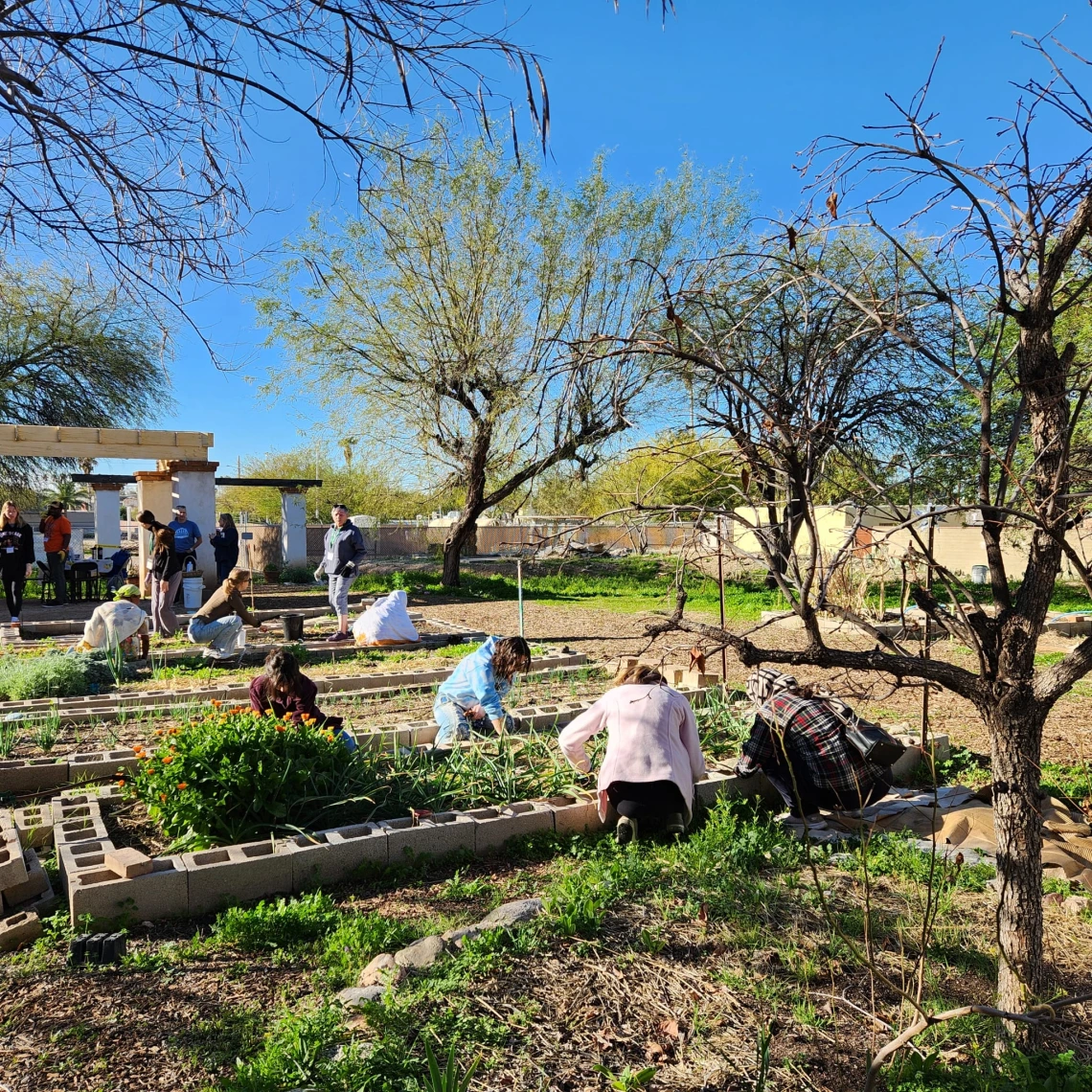CAPLA students collaborate with Iskashitaa Refugee Network on experiential learning garden

Last spring, College of Architecture, Planning and Landscape Architecture Sustainable Built Environments Lecturer Nataliya Apanovich partnered with Iskashitaa Refugee Network to create a study concerning issues among University of Arizona students and United Nation (UN) Refugees.
Dr. Apanovich’s previous work with Iskashitaa Refugee Network allowed her to identify some similarities in the issues that both her students and United Nation refugees were facing.
“Over the past two years, I saw a lot of mental health struggles,” says she said. “I wanted to help, and I relied on what I knew and had done in the past – I took my students to work in a garden.”
Iskashitaa Refugee Network is a nonprofit in Tucson, whose mission is to integrate UN refugees into the Southern Arizona community through innovative local food-based programing, like harvesting, food preservation and gardening. Iskashitaa provided informed experiences for students and introduced them to the diverse challenges refugees face. Through this collaboration, CAPLA students widened their worldview.
To make this study feasible, Dr. Apanovich and fellow Sustainable Built Environments Lecturer, Dr. Garrett Smith, applied for the Peter & Pat Hirschman University-Community Partnership Research Fund. They were the first recipients of the grant, meant to strengthen the connection between the University of Arizona and the local community.
With this funding, they were able to: hire students and Iskashitaa volunteers to assist with the project; offer stipends for participants; and provide materials and resources to improve the area where the study took place. It also allowed them to pay community members to lead workshops on rainwater harvesting and composting, and for refugee chefs to prepare food for the participants. Part of the funding went to Jacob Davis, an Iskashitaa volunteer, who created a video documenting the experience.
This project, which took place over the course of 10 weeks, paired up 10 CAPLA students and 10 UN refugees to work in the Iskashitaa experiential learning garden. Each week, the pairs were assigned various tasks including garden maintenance, managing the compost system, weeding, planting seeds for the spring garden and harvesting winter produce.
After working in the garden, participants enjoyed a breakfast prepared by local refugees, many of which were part of the project. Sharing breakfasts from Eritrea, Ukraine, Burundi, Syria, and The Democratic Republic of Congo encouraged community between refugees and students.
Creating a project as unique as this one didn’t come without challenges.
Most of the refugees that the students worked with were in the process of resettling in the United States due to fear of persecution based on their political activities, religion, race, nationality, or social group involvement in their home county. To prepare the students, Iskashitaa gave a presentation that included basic education on what a refugee is, what challenges they face, and cultural awareness.
Another challenge was the language barrier between the students and refugees, as each of the refugees that participated in the project were at various levels of learning English.
For each refugee that participated in the program who didn’t speak English, Iskashitaa helped provide interpreters that came from within the refugee community rather than outside sources that weren’t as versed in working with refugees. Languages such as Dari, Swahili, Kirundi, Ukrainian and Spanish were some of the few that were represented during this study.
“We looked inside the immigrant and refugee community to hire interpreters,” says Dr. Apanovich.
Students who participated spoke about what the experience meant to them.
“I made new friends, learned more about how to cultivate food, and became more aware of the reality of being a refugee,” says one participant.
“I've gained a wealth of cultural and technical skills. I had the opportunity to engage with individuals deeply affected by a war,” says another participant.
Participant, Gene King, who is currently in her third year of the B.Arch program, described the experience as eye-opening.
“We had the opportunity to work with individuals from all over the world including Ukraine, The Democratic Republic of Congo, Burundi, Pakistan, Eritrea, Cameroon, Hati and Afghanistan,” King said. “Working with them taught me things that I am so thankful to have had the opportunity to learn.”
The most important thing King learned was how to effectively and respectfully communicate with a diverse group of individuals.
“I think that many of us, myself included, tend to get very comfortable in the bubbles that we live in, to the point where we have trouble empathizing with others and appreciating our differences,” he said. “With a little bit of patience and understanding, I think we all started to realize that, although we were all very different individuals with very unique experiences, we all have in common the fact that we are humans who, at the core of it all, tend to share very similar challenges.”
Over the 10-week endeavor, the connections formed were visible.
“It was incredibly beautiful to see how everyone changed, from the first day attending the garden, nervous and scared, to the final celebration where everyone shared food, shook hands, danced, sang and laughed together, despite their differences and without an ounce of fear,” King said.
Dr. Apanovich is using these outcomes to redesign her future Introduction to Sustainability course to be a community-engaged experiential learning course.
“We hope to continue partnering with Iskashitaa through different projects and events,” she said. “I think understanding and engaging with the community is valuable not only for our human well-being but also for the health of our planet.”



